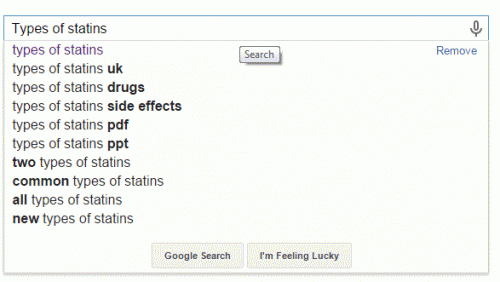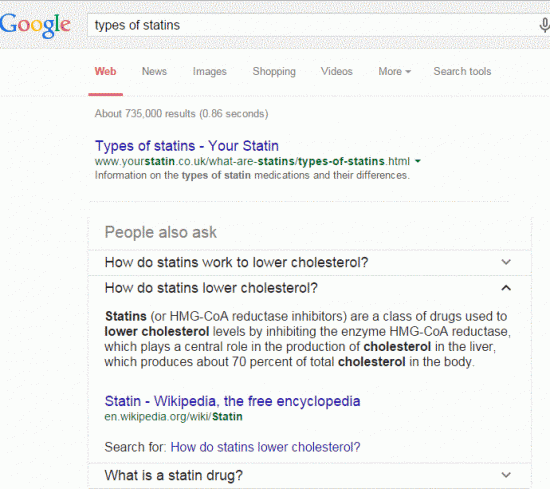There have been reports (http://searchengineland.com/google-tests-new-mobile-search-design-people-also-ask-box-219078) for several months that Google has been testing a new query refinement box called “People also ask”. It now looks as though it has gone live. The feature suggests queries related to your search after the first few entries in your results list. It doesn’t appear for all queries and it is dependent on how you ask the question. My search on ‘what are statins’ gave me the usual, standard results list. When I searched on ‘types of statins’ the ‘People also ask’ box popped up with “How do statins work to lower cholesterol?”, “How do statins lower cholesterol?” and “What is a statin drug?
To see further information you have to click on the downward pointing arrow next to the query but instead of a list of sites you see just an extract from a page supposedly answering the question, a bit like the Quick Answers that sometimes appear at the top of your search results. There is an option, though, to run a full search on the query you have chosen. As with the Quick Answers, there are no clues as to how or why Google has selected a particular page to answer the query.
The queries for ‘People also ask’ are also different from the suggested queries that are listed as you type in your question into the standard Google search box.
Those of you who have attended my talks and workshops will no doubt be waiting for me to come up with an example of a Google howler. Here it is: a search on ‘tomato blight prevention uk’ comes up with “What is potato blight?” (close, and the organism that causes late potato and tomato blight is the same) and “What is an ANEMBRYONIC pregnancy?”.
No, I don’t know what an ANEMBRYONIC pregnancy is (why the capital letters?) but it has nothing to do with potato or tomato blight!
At present, this is not a feature that I am finding useful. For me it is a hindrance rather than a help and just clutters up the results page with superficial or irrelevant suggestions. But as my queries tend to be quite complex and often incorporate advanced search commands, which seem to disable it, I don’t expect to be seeing much of this feature.

